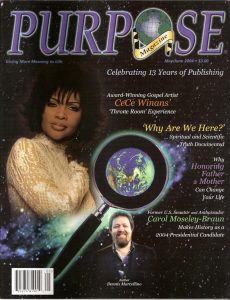By Dr. Daniel Haupt
In the grand prophetic tapestry of life, there are two pivotal times that define our existence: the day we are born and the day we discover why. This sentiment underscores the profound truth that each of us is uniquely fashioned for a purpose and destiny beyond the confines of happenstance or coincidence. To elaborate on this theme, I urge you to delve into the depths of your being to uncover the divine blueprint that shapes your journey.
In a world fraught with distractions and uncertainties, the quest for purpose can seem like an elusive endeavor. Yet, destinies are not coincidental, but meticulously crafted plans ordained by the hand of God. Before inception, your purpose was etched into the annals of time and eternity, awaiting manifestation in the earthly realm. Embracing this truth frees us to transcend the transient, and align with the eternal, stepping boldly into our divine calling.
We are all intricately SHAPED by our Creator for a destiny infused with significance and intentionality, signaling us to accept our unique design. Accepting this original and personal blueprint, empowers us to stride
confidently into the fulfillment of our purpose. To unlock destiny, examine how you are SHAPED for purposeful living.
What Does it Mean to be SHAPED?
Few people discover their purpose to live destiny, but there are usable tools to unveil personal qualities and characteristics that aid in identifying purpose. How one is wired; personal traits, experiences, desires, and more, reveal how he or she is SHAPED. Destiny is a destination predetermined by God that unfolds through us. The SHAPED acronym serves as a guiding light, illuminating attributes that shape individual purpose and destiny. Each meaningful letter is explained below.
S stands for an array of Special Endowments or innate gifts God has invested in us, even before birth. These inbuilt abilities and talents can be performed perfectly to solve problems and add value to the lives of those we are called to impact. God has deposited in us His Spirit, which inspires us to greatness. If you are unaware of your gifts, abuse of them is almost unavoidable. The first step in living a purposeful life is to discover your natural endowments, which include anointings, gifts, callings, and talents. There is a divine reason and purpose for your existence. It could be music, singing, public speaking, inventing, writing, teaching, business, technical expertise, athletics, medical and healing, caring for others, etc. Special endowments are not earned but God-given. Yet, these need to be studied, practiced, and refined. What are your special endowments? Think about it and write it down.
H stands for Heartbeat because the heart is our divine instinct and the seat of intuition, visionary intelligence, passion, inspiration, and drive that impulsively direct our steps. Also, the heart fuels the operation of gifts by heart-felt instinct. It is that part of us that carries and sustains our yearning and energy on the route toward destiny. A healthy heart is the spring of a meaningful life; but a with daily defeated impulses can never win. Proverbs 17:22 (NIV) says, “A cheerful heart is good medicine, but a crushed spirit dries up the bones.” Just as the ear serves as an organ to hear audible sounds and help maintain balance in vertebrates, the heart is the inner ear through which we can connect with God and maintain balance while going through life. Dreams and purpose get nourished or famished in the heart. Everything we do flows from it (Proverbs 4:23). The heart operates the inward voice which provides direction and clarity on a path toward destiny that is a direct route but not a straight line.
A represents Ability, which is an essential aspect of our purpose and destiny equation. Ability is what one is capable of through education, training, and experiences. So, abilities are developed into skills. Unlike Special Endowments, which flow naturally from within and from God, abilities and skills do not come naturally, but must be developed through education, training, practice, and experiences. Abilities and skills enable excellent performance in purpose that complements special endowments. For example, a talented vocalist may learn to read music and teach voice lessons for a living. The voice is the special endowment while reading music and teaching voice is an ability and skill. This could be working with children, electrical or plumbing work, nails and hair care, graphic designing, and other professional fields or hobbies. What abilities and skills have you learned and used for profitability, earnings, or to help others?
P is for Personality. Each personality opens a unique lens through which the world is viewed and responded to. It serves as a pattern, predicator or model for life and greatly influences what we are and become. Personality expert and author, David Funder, defines personality as “a collection of relatively discrete, independent and narrow social capacities.” It involves character, temperament, disposition, worldview, etc. The way God made your personality was determined by what He wants you to become and do. Introvert and extrovert personality types are distinctively designed by God for relating uniquely to others. However, God wired you to relate to your world with either left-brain or right-brain dominance; not both. For example, a person who is left-brained is more logical, analytical, and practical. The right-brained individual is more holistic, artistic, innovative, and emotional. According to the theory of left-brain or right-brain dominance, each side of the brain controls different types of thinking. These two types of thinking are expressed in the way individuals apply their purpose and destiny to life.
E is for Experiences and Environments, which are involvements and places to build personal strengths and overcoming traits wherever we are born, grow up, attend school or church, live, work, or retire. Experiences and environments can be desirable or undesirable, challenging or easy, safe, or dangerous, but there is a reason for being there, whether we like it or not. There is a learning opportunity in every experience. God, being the Potter and Maker, places us in environments that are perfect for His plans for our lives. He allows certain experiences to shape us for our destiny. The experiences and environments in your life are fundamental to how you are “SHAPED” and prepared for the future. The wilderness sometimes is the route to the Promised Land and the dark valley can also lead to the sunlit hill and horizon. Allow experiences teach life lessons, enhance maturity, and make you stronger while going through enjoyable and painful times. Experience can bring out the excellence of God in you, especially if you learn to handle situations with prayer and God’s word. World renowned author and purpose expert, Myles Munroe, says, “Purpose transforms mistakes into miracles and turns disappointments into testimonies.” God does not see your past mistakes the way you see them. You might see a mess, but God sees a message and platform for miracles. “Many are the plans in a person’s heart, but it is the Lord’s purpose that prevails” (Proverbs 19:21 NIV).
D is for Destiny—everything that will happen during our lifetime and in eternity, planned or unplanned. Yet, we are empowered to impact our destiny through decisions and actions. Everything about the way we are SHAPED leads us to purpose and destiny. One thing we all have in common is being born into the world with a purpose and destiny, which is a direct route not never a straight line. Purpose is the overall reason why we are here and there is no one born without a purpose. God says in Isaiah 46:10, “I have known the end from the beginning, from ancient times, what is still to come. I say, ‘My purpose will stand, and I will do all that I please.’”
In conclusion, explore how you have been SHAPED for an uncommon destiny. Through introspection and exploration, we uncover the Special Endowments, Heartbeat, Ability, Personality, Experiences and Environments, and Destiny that define our trajectory. Destiny is a destination with a purpose for which we were made, not a purpose we made for ourselves. So never try to become someone else. You are uniquely designed for your destiny. For in the crucible of purpose, we discover the essence of our being and the fullness of our potential. Let us heed the words of 1 Peter 2:9, recognizing our inherent nobility as a chosen generation, destined to illuminate the world with the radiance of our purpose. May we rise to the occasion, embracing our destiny with courage and conviction, knowing that we are SHAPED for such a time as this.
What God has made crooked, let no man make straight. -Ecclesiastes 7:13








